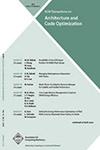在异构系统上自动调优线性代数的性能感知运行时
IF 1.8
3区 计算机科学
Q4 COMPUTER SCIENCE, HARDWARE & ARCHITECTURE
引用次数: 0
摘要
密集线性代数运算在高性能计算(HPC)应用程序中非常频繁地出现,因此其性能对于实现最佳可伸缩性至关重要。由于许多现代HPC集群包含多个gpu节点,BLAS操作经常在gpu上卸载,因此需要使用优化的库来确保良好的性能。不幸的是,多gpu系统伴随着两个重大的优化挑战:数据传输瓶颈以及具有不同内存的多个工作人员(gpu)中的问题分割和调度。我们证明,目前用于解决这些挑战的多gpu BLAS方法针对非常具体的问题和数据特征,导致任何轻微偏离工作负载的严重性能下降。此外,还忽略了一个更为关键的决策,因为使用当前基于调度器的方法无法解决这个问题:确定应该将哪些设备用于某个例程调用。为了解决这些问题,我们提出了一种基于模型的方法:使用性能评估在运行时提供特定于问题的自动调优。我们将这种自动调优集成到一个名为PARALiA的端到端BLAS框架中。该框架将自动调优与优化的任务调度器结合在一起,从而实现近乎最佳的数据分布和性能感知的资源利用率。我们在拥有8个NVIDIA-V100 gpu的高性能计算测试平台上对PARALiA进行了评估,在大型和多样化的数据集中,GEMM的平均性能提高了1.7倍,能效提高了2.5倍,并展示了我们的性能感知方法对未来异构系统的适应性。本文章由计算机程序翻译,如有差异,请以英文原文为准。
PARALiA : A Performance Aware Runtime for Auto-tuning Linear Algebra on heterogeneous systems
Dense linear algebra operations appear very frequently in high-performance computing (HPC) applications, rendering their performance crucial to achieve optimal scalability. As many modern HPC clusters contain multi-GPU nodes, BLAS operations are frequently offloaded on GPUs, necessitating the use of optimized libraries to ensure good performance. Unfortunately, multi-GPU systems are accompanied by two significant optimization challenges: data transfer bottlenecks as well as problem splitting and scheduling in multiple workers (GPUs) with distinct memories. We demonstrate that the current multi-GPU BLAS methods for tackling these challenges target very specific problem and data characteristics, resulting in serious performance degradation for any slightly deviating workload. Additionally, an even more critical decision is omitted because it cannot be addressed using current scheduler-based approaches: the determination of which devices should be used for a certain routine invocation. To address these issues we propose a model-based approach: using performance estimation to provide problem-specific autotuning during runtime. We integrate this autotuning into an end-to-end BLAS framework named PARALiA. This framework couples autotuning with an optimized task scheduler, leading to near-optimal data distribution and performance-aware resource utilization. We evaluate PARALiA in an HPC testbed with 8 NVIDIA-V100 GPUs, improving the average performance of GEMM by 1.7X and energy efficiency by 2.5X over the state-of-the-art in a large and diverse dataset and demonstrating the adaptability of our performance-aware approach to future heterogeneous systems.
求助全文
通过发布文献求助,成功后即可免费获取论文全文。
去求助
来源期刊

ACM Transactions on Architecture and Code Optimization
工程技术-计算机:理论方法
CiteScore
3.60
自引率
6.20%
发文量
78
审稿时长
6-12 weeks
期刊介绍:
ACM Transactions on Architecture and Code Optimization (TACO) focuses on hardware, software, and system research spanning the fields of computer architecture and code optimization. Articles that appear in TACO will either present new techniques and concepts or report on experiences and experiments with actual systems. Insights useful to architects, hardware or software developers, designers, builders, and users will be emphasized.
 求助内容:
求助内容: 应助结果提醒方式:
应助结果提醒方式:


